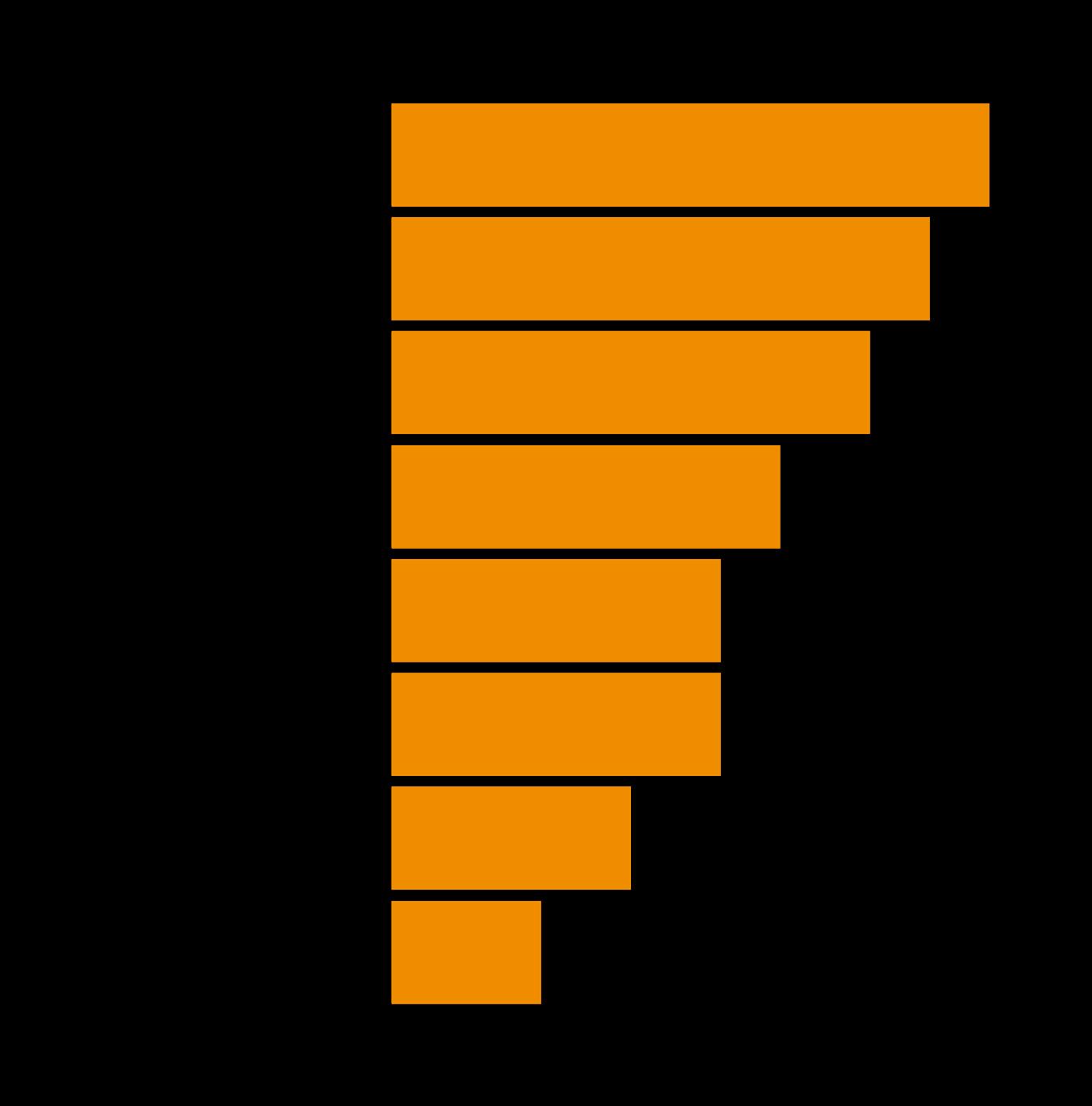BACKGROUND AND GROWTH DRIVERS
What is driving hedge fund implementation, what has been holding it back, and what could accelerate it in the future?
The imperative to scale operations without adding headcount stands out as the primary catalyst driving fund managers toward AI and automation solutions. According to Hedgeweek’s Q2 survey, over two-thirds of respondents identified this factor as their key motivation for exploring artificial intelligence technologies. Quality enhancement through error reduction ranked as the second most significant driver, cited by 52% of managers, while cost reduction imperatives followed at 35% of respondents.
As respondents could select multiple factors influencing their AI adoption decisions, percentages sum to more than 100%, reflecting the overlapping motivations driving technological investments.
The benefits of AI are acute in investment research. Natural language processing (NLP) is used to algorithms read earnings transcripts and attempt to interpret a firm’s situation.
“For instance, was earnings news positive or negative? Was there a change in the language from previous announcements? Were there any red flags? This can now be applied to not only text but also to live calls and conversations,” says Peter Wasko, Senior Portfolio Manager at Copia Capital, a London-based discretionary fund manager.
Fund managers can also gather many different data points such as financial figures and trading patterns. “I suspect AI is changing the game in terms of the speed and amount of data being processed and this is improving inference – the ability to come to conclusions
about a set of data,” says Wasko. “It’s a bit of an arms race, with the biggest tending to lead the way.”
Man Group’s use of AI extends far beyond the investment process. Mace says: “The firm’s internal chat tool, ManGPT, is used regularly by over 70% of the business and is changing the way people work. Coding copilots are also available to everyone who writes code at Man Group.”
UK-based Man Group is best known for its AHL trend-following strategies. Tim Mace, Head of Data and Machine Learning, Man Group, says his firm has been using AI in investment processes for over a decade, including current use cases of sentiment analysis, timeseries forecasting and optimal execution.
Within Man Group there’s also ongoing development of advanced tools such as Alpha Assistant, which aims to automate the systematic research process by writing and back-testing trading strategies.
Minotaur Capital was set up so its founders could “embed AI into its core processes from day one,” says Rice. It started developing its proprietary system, Taurient, just two days after founding in November 2023. “Taurient acts as our firm’s operating system, with AI driving critical elements of our investment process and daily operations,” he says.
Regulatory requirements are the least important factors. This is likely because regulatory reporting needs to be “precisely
(Select all that apply)
Analyst Note: Respondents could select multiple factors influencing their AI adoption decisions, percentages sum to more than 100%
Fig 1.1 What is driving your firm’s decision to explore AI/automation solutions?
Source: Hedgeweek 2025 Investor Survey
Source: Hedgeweek 2025 Investor Survey
right,” says Subramanian, such as the operational function of trade matching. This means there cannot be any flaws in the architecture, systems or operational processes. “There are other areas when you have a probabilistic range of acceptable answers, and the speed of getting that answer quicker, which is more right than wrong, is of importance.”
The interviewed hedge funds were unanimous that AI/automation solutions are producing the expected gains.
Minotaur Capital’s AI software Taurient scans c.35,000 news articles weekly, generating investment ideas, company snapshots, initial theses and recommends ‘next investigation steps’. It also summarises earnings reports, validates existing theses, assesses news materiality and provides automated daily market briefings. AI also drives some of its automated scraping.
Thomas Rice, Co-Founder and Co-Portfolio Manager at Minotaur Capital, who also developed its AI software, says: “AI has exceeded our initial expectations. Since our launch in November 2023, improvements in LLMs, particularly recent models like Gemini 2.5 Pro and functionalities like OpenAI’s Deep Research, have dramatically advanced our research and coding capabilities. While AI isn’t yet making full investment decisions independently, it takes us much further into the research process than we initially envisioned.”
Regents Gate’s White says: “AI has lived up to expectations given the nuanced approach
of how we apply it – moving a manual process of determining what data is relevant, to a scalable, more accurate method where we harness the power of vast amounts of orthogonal datasets and make them more actionable in a consistent and repeatable manner.”
HOLDING BACK
Hedge funds are being held back from further implementing AI/automation solutions by a range of concerns. The most common reason is other priorities taking precedence, suggesting openness to implementing. The next most cited reason is a lack of internal expertise, which suggests a role for third-party support.
To a lesser extent, hedge funds have concerns about data quality, costs and return on investment, but these may dissipate as the technology matures. Challenges in integrating solutions with existing systems is firmdependent, but also suggests benefits from third-party support. Fewer than 5% of funds suggest suitable vendor options are limited, suggesting vendor offerings are very well targeted.
THE FUTURE
Hedge funds would be most likely to accelerate their adoption of AI/automation by the availability of turnkey solutions requiring minimal customisation, suggesting openness to third-party provider solutions.
Fig 1.2 What factors have prevented your firm from implementing AI/automation solutions thus far? (Select all that apply)
This is followed closely by clear case studies demonstrating ROI and then more affordable solutions, suggesting a continuation of the past financial concerns mentioned above. Competitive pressure and regulatory guidance or requirements were also mentioned, but far less frequently.
Man Group is now focused on agentic AI, or systems that are capable of handling multi-step workflows. “It could significantly accelerate quant research and reduce the time it takes to identify new sources of alpha,” says Mace. “Importantly, we continue to view AI as a tool for human augmentation rather than pure automation, aiming to enhance productivity and innovation across the business. We expect AI use to grow and for it to have an impact on all parts of the business.”
Rice expects AI’s role in investment management to grow “exponentially”. The Australia-based Minotaur Capital takes a technology-driven, AI-led approach to global equities. It is pushing deeper into automated research workflows, particularly in extending AI’s role beyond idea generation into more sophisticated analysis.
“Ideally, we’ll soon be able to scan thousands of companies continuously, automatically ingest their materials, analyse them through the lens of our investment philosophy, develop preliminary theses, and alert us when compelling opportunities emerge, complete with specific next steps that require a human in the loop,” says Rice.
“As LLMs and public data become increasingly commoditised, differentiation will come from how firms embed their unique investment philosophies into these systems. LLMs excel at answering questions, but they don’t determine which questions matter – that’s where human expertise is essential.”
Minotaur is systematically translating its approach into frameworks that guide its AI systems, to ensure “they extend our thinking rather than replacing it,” he adds.
“Within the next five years, it’s likely that successful investment firms will rely heavily on AI integration. However, we think the real differentiator won’t simply be technological sophistication, but how effectively firms combine AI capabilities with their distinct investment approaches and philosophies,” he says.
Fig 1.3 What would most likely accelerate your adoption of AI/automation solutions?
Source: Hedgeweek 2025 Investor Survey
Man and machine
While increasingly useful and reliable, AI still heavily depends on human input. Umesh Subramanian, CTO of Citadel, speaking at the Milken Conference in May, notes that some of his firm’s quantitative businesses use current and backward-looking data to project forward. He notes that the critical question is how long a trend will continue and the level of conviction the data can support.
“Can I use tools within a toolbox to be able to project? We’ve been using statistical methods, machine learning and AI as a set of ways to project forward…. Human judgment becomes very important and is going to be very levered,” says Subramanian.
“Looking forward, thinking about how regimes are shifting and points of inflection are happening in the world, testing is exceptionally critical to be able to make money as an alpha money maker. There’s going to be a lot of leverage in the system with AI as a tool in the toolbox.
“It’s not about the AI trying to tell you what the future will look like, because
it cannot project. The question really is, can you see the present clearer and faster with something like AI as one tool in the toolbox? That’s a real question.”
The name Minotaur – half human and half bull – symbolises the combination of human insights with powerful analytical systems. “Ultimately, we believe sustainable investment success will depend on harnessing AI to augment, rather than replace, human judgment. We believe this positions us well for navigating the increasingly competitive investment landscape,” says Rice.
Regents Gate’s White says: “We are already fully deploying AI ML techniques in tandem with the domain expertise of our CIO, in a ‘man-meetsmachine’ approach given the adaptable intelligence needed when managing capital in addition to leveraging the significant technological advancements in recent years.”
Efficiency through AI manifests through, what I call ‘data centaurs’ – humans augmented with technological capabilities. In this model, AI forms the supporting structure while humans maintain control, context, and accountability. This combination creates superpowers without replacing human judgment.
Matthew Katz
Senior Vice President, Field CTO, Arcesium
(Read our full interview with Katz on the next page)
MATTHEW KATZ
Senior Vice President, Field CTO, Arcesium
Our research found smaller funds leading in comprehensive AI implementation. What advantages do you think enable this innovation at smaller scales?
One first thought is that large firms are often more complex. Organizationally, they have more approvers, more committees – you know the story. Beyond this surface-level explanation, there’s a deeper factor: data volume. The larger you are, the more data you have, making clean data and governance critical. When you’re dealing with many terabytes or petabytes of information, implementing change becomes challenging. Getting data ready for use by AI models is simpler at smaller volumes and managing data so it is ready for AI implementations is easier. Smaller teams can establish data governance more effectively, process manageable amounts of data and solve problems incrementally. This creates a virtuous cycle to experiment, learn from initial attempts and quickly pivot to better approaches – something that requires much more infrastructure and coordination in larger organisations. At any size, we see potential
for firms to achieve significant benefits from investing in innovation.
With two in three funds citing “scaling without adding personnel” as their primary motivation for AI exploration, how is Arcesium helping clients achieve this balance?
Arcesium functions as an efficiency enabler from the start. Our technology is designed to help firms modernize their operating models, streamline complex workflows, and empower firms to scale and grow efficiently even before any AI. For any AI initiative to succeed, data quality is essential. You know the rule: ‘garbage in, garbage out’. You must not feed your new AI superpowers garbage. Our Aquata® platform empowers firms with a ‘golden source’ of data and consistent data models that they can use for their AI initiatives. We’re committed to enabling both data and operational workflows with AI; leveraging data quality checks on trade bookings is one way to enable scale and efficiency. Rather than every firm reinventing these foundations, our goal is to provide the infrastructure so they can focus
their time on core business and investment differentiators.
What explains the regional disparity in AI adoption, with North American hedge funds implementing AI across multiple functions at a much higher rate than European and APAC counterparts?
Two factors can help put this regional variation into context. First is a potential ‘water cooler effect’ – where ideas may socialize or amplify within a geographic cluster and thereby create further momentum. Second is the different regulatory landscape and historical approaches. North American funds currently face specific investor and regulatory pressures that drive innovation. They will use the newest technology available to respond. European firms may already have established data handling protocols before the AI boom. There’s less pressure to “fix” something that’s working. Looking forward, I believe firms with strong foundational practices will navigate future opportunities or challenges smoothly while others face expensive rework. Good foundations now mean adaptability later for whatever the next crisis is.
Beyond the efficiency gains our research identified, what other tangible benefits are funds experiencing from their AI implementations?
Efficiency is primary, but the way it manifests is through what I call ‘data centaurs’—humans augmented with technological capabilities. In this model, AI forms the supporting structure while humans maintain control, context, and accountability. This combination creates superpowers without replacing human judgment. The journey toward implementation also delivers surprising secondary benefits.
When organisations prioritise data quality for AI, they see improvements throughout their operations: reduced error rates, decreased operational friction, earlier anomaly detection and more effective troubleshooting. Even traditional business intelligence tools perform better without requiring extensive computing resources. Taking data seriously for AI implementation improves every aspect of data utilisation across the organisation.
Looking ahead, how do you envisage AI reshaping competitive dynamics in the hedge fund industry over the next 3-5 years?
We’ll see distinct phases of innovation as we identify what truly works in practice. Currently, there’s excitement about autonomous agents, but we’ll inevitably discover their boundaries. Success won’t come from making the single correct technology bet but from positioning to adapt quickly through multiple innovation cycles. The winners will be firms taking calculated risks with limited downside, creating compound benefits where efficiency in one area enables experimentation elsewhere. They’ll maintain the ability to run parallel tools, make pivots when needed and scale promising approaches. The competitive advantage won’t be which model you chose initially, but how well you structured your organisation to evolve alongside rapidly changing technology.
OPERATIONAL DEEP DIVE
A range of internal factors combine to determine hedge funds’ appetite to implement AI/automation solutions.
Fig 2.1 Which statement best describes your firm’s current approach to artificial intelligence and automation in operational processes?
Source: Hedgeweek 2025 Investor Survey
The most common level of AI/automation implementation is in limited operational areas with plans to expand, suggesting a level of specialisation. The most extreme positions, of comprehensive implementation and having no plans, were also the least common.
MULTIPLE OPERATIONAL FUNCTIONS
AI/automation solutions have been implemented across a wide range of functions at Man Group. For systematic investment teams, machine learning is used for tasks such as non-linear signal combination and NLP, as well as extracting reference data from catastrophe bond prospectuses.
Says Mace: “For discretionary portfolio managers, AI is used to summarise unstructured data sources such as corporate news feeds and annual reports. In trading and execution, reinforcement learning powers automated trade routing. Data operations teams use AI to categorise the importance of data vendor notifications. Finally, client services teams use AI to make it easier to search for and find relevant Man Group fund information.”
Beyond investment research, Minotaur uses AI to assist in areas including coding, personalised investor communications and enhanced CRM functionality. “When someone joins our distribution list, our system, using AI and scraping, automatically builds a profile for that prospective investor,” adds Rice. “To us, AI isn’t a buzzword, it’s the beating heart of our business, central to everything that we do.”
Citadel’s Subramanian adds: “The discretionary side is getting interesting”, due to the volume data and documents processing that can be speeded up by AI. “We’ve accelerated the time in which people who make decisions can get access to information, to then be able to make timely decisions,” he says, adding he calls it “productivity plus” as it’s so much faster.
REGIONAL VARIATIONS
North American hedge funds are the clear leaders in AI/automation adoption. They made up 84.6% of funds that have already implemented AI/automation solutions across multiple operational functions. The only other hedge funds at this advanced stage are based in Europe.
Beyond this, the situation is more nuanced. North American hedge funds that have implemented to some degree are evenly split by level of implementation, with only those with no immediate plans making up a significantly smaller share (13%).
European funds were far more likely to be in a partial state of implementation. Exactly onethird have implemented in limited operational areas and a further 54.2% were either currently evaluating or piloting, or remain interested but are not implementing. Only 8.3% had already implemented across multiple functions and 4.2% had no immediate plans.
Managers with AUM less than $500m
Managers with AUM more than $500m
Fig 2.2 Level of implementation by AuM
Source: Hedgeweek
Source: Hedgeweek 2025 Investor Survey
Asia-Pacific hedge funds were heavily concentrated in implemented in limited operational areas (60%). It is the only region where a significant number of hedge funds had no immediate plans (20%) and where no funds had already implemented across multiple operational functions.
NIMBLE FUNDS
The total AuM of a hedge fund manager also has an impact. Those that implemented across multiple operational functions are concentrated towards the lower end of the size scale. Dividing the sample at $500m AuM shows differently skewed distributions.
FLAGSHIP FUND
A hedge fund manager’s flagship strategy influences its commitment to implementation. Those with managed futures flagship funds were most likely to have implemented across multiple or limited operational functions. Almost two-thirds of those with digital asset flagship strategies in were in a similar position. Between 25% and 50% of all other fund strategy types had implemented in multiple or limited areas.
London-based Regents Gate Capital pursues a fundamental equity market-neutral strategy, with the aim of delivering consistent, uncorrelated and superior risk-adjusted returns over time. Josh White, Co-Founder and Chief Investment Officer at Regent Gates says there is “full integration” of AI machine-learning (ML) into his firm’s investment process.
Fig 2.3 Level of implementation by strategy (% implemented in multiple or limited areas)
“This enables us to have a holistic approach from beginning to end – from the ingestion of millions of data series into our fundamental equity market neutral strategy to where proprietary AI ML techniques allow us to have scalability across our universe and greater and earlier accuracy in predicting fundamental KPIs. We have an informed view on more than 300 companies with accuracy above 70%,” he says.
OPERATIONAL EFFICIENCY IMPROVEMENTS
By far the most common outcome of implementation is a significant efficiency improvement. Almost 10% benefited from a transformational improvement and the vast majority confirmed at least some improvement.
Regents Gate’s White says: “AI machinelearning provides us with a differentiated approach. In addition to giving us the opportunity to deliver consistently uncorrelated returns – the differentiated process is typically less impacted by macro-driven equity markets / dislocated markets, or crowding factors / short squeezes.
“It removes behavioural bias, and the inefficiencies of having teams of analysts trying to distil what data is important, and how to apply it.”
AI has significantly improved Minotaur’s ability to identify investment opportunities and conduct research more efficiently. Rice says Taurient creates detailed company snapshots
Fig 2.4 What impact has AI/automation had on operational efficiency in areas where you’ve implemented it?
Source: Hedgeweek 2025 Investor Survey
Fig 2.5 How do you primarily source your AI/automation solutions for operations?
Source: Hedgeweek 2025 Investor Survey
in minutes that historically took analysts days to complete.
“Our AI-driven idea generation process is invaluable, automatically scanning and assessing articles in multiple languages, including foreign language sources we may have overlooked. It notably led us to Chugai Pharmaceutical, a successful investment we likely wouldn’t have otherwise discovered.”
AI has substantially increased Minotaur’s research capacity and scalability, but the firm has not opted to reduce headcount. Rice says AI is “supercharging” its research process by gathering information almost immediately rather than relying on updating analysts’ periodic reports. For example, its ability to react to JD Vance’s Munich Security Council speech “demonstrates how AI is helping us move faster than our peers,” he says.
While he says, “AI enhances every part of our process”, success “isn’t immediate or universal”. He says the journey to AI replacing a process “often involves extensive iteration”. The bar for trusting AI-generated investment research is “extraordinarily high – as it should be”, he adds.
Rice says building robust systems requires an extensive test and evaluation framework where methodologies are rigorously validated against desired outputs. “Now, when new models emerge, we can systematically assess their performance,” he says.
“Discipline has helped us avoid the common pitfall of over-reliance on flashy but flawed implementation. We recognise AI’s limitations and maintain human oversight over all systemgenerated insights. At this stage, human judgment remains irreplaceable.”
SOLUTION SOURCE
Hedge funds are most likely to build solutions in-house, with almost half reporting it as the primary source. The next most popular route is purchasing from specialised vendors, followed by taking a hybrid approach.
Minotaur Capital predominantly builds in-house while leveraging third-party LLMs. “We’ll adopt external tools like OpenAI’s Deep Research when they offer unique capabilities that we haven’t yet developed ourselves,” Rice says.
Internal development “helps us to precisely tailor systems to our investment philosophy” and “rapidly iterate as new functionality emerges”, he says. “It also enables us to embed proprietary datasets and insights that differentiate our analysis.”
Rice says that chat interfaces, while useful, create bottlenecks. “The real power of AI emerges when processes run at scale across thousands of stocks simultaneously, which is a capability that off-the-shelf solutions rarely provide” he adds.
VENDOR CHOICE
The choice of vendor is clearly important. A third (33%) of those that took this route achieved a significant improvement, 44% some improvement and 22% minimal improvement. The hybrid approach produced more variable results; it is more likely to produce both transformative results and minimal results.
Man Group uses third-party providers for foundational LLMs, such as those available from OpenAI or Anthropic. It also uses thirdparty code generation tools.
Mace says: “We build internal tools, such as ManGPT, where we want to integrate thirdparty models with our internal data and applications. This gives us more control over the implementation and our data, allowing us to create bespoke capabilities that wouldn’t be possible with third-party tools alone.”
Fig 2.6 What impact has AI/automation had on operational efficiency in areas where you’ve implemented it?
took specialised vendor approach
Source: Hedgeweek 2025
Managers that
Managers that took hybrid (build and buy) approach
CONCLUSION
Implementing AI/automation solutions clearly leads to increases in operational efficiency. While the extent of these gains may vary, this is true across funds of all sizes, locations and strategies. More than half of all funds surveyed experienced significant or transformative improvements.
AI/automation is spreading through hedge funds’ business models. While the benefits are perhaps clearest in supporting the investment process, there is a wide range of potential applications that can save resources and help businesses focus on their core function of generating alpha.
AI/automation is particularly useful when a hedge fund is seeking to scale its operations, as it enables it to do so without increasing headcount and therefore significantly increasing costs. Indeed, this was the most cited reason given for exploring implementation.
But this does not mean AI/automation is replacing humans. The best outcomes flow from combining finely tuned solutions with the experience and skill of human talent.
Almost half of hedge funds build solutions in-house. This may be the best solution in some cases, perhaps when a fund has unusual requirements, but hybrid and vendor supplied solutions can also provide sharp improvements and implementation is likely to be faster.
CONTRIBUTORS:
Manas Pratap Singh Head of Hedge Fund Research manas.singh@globalfundmedia.com
Johnathan Glenn Head of Design FOR SPONSORSHIP & COMMERCIAL ENQUIRIES: Please contact sales@globalfundmedia.com



























